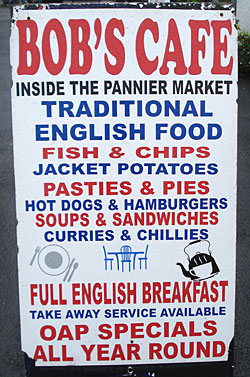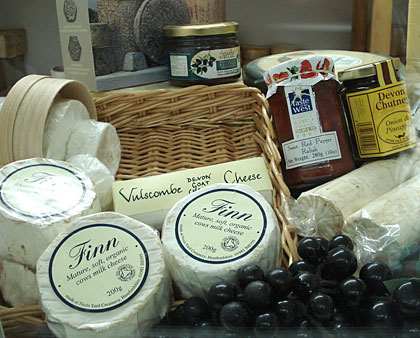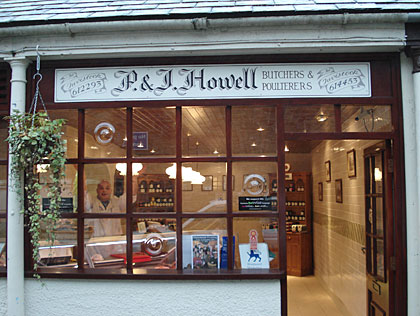Impressions of England, strictly food-related
 I am back from England. As is usual when I go there, in a food sense it was a mixed bag. On the positive side, I got to experience two real, unique - and very different - highlights in The Pudding Club and The Fat Duck. I also got to visit some wonderful local food shops in the town of Tavistock in Devon, close to the Cornwall border, with my good friend Mimi and her husband Alan - a great cheese shop selling all kinds of locally produced cheeses; a very impressive all-around gourmet shop, and two tiny stores selling all kinds of delicious looking things. I also had my cornish pasty fix. I'll describe my Fat Duck and Pudding Club experiences in detail in later posts, but here's an overview of some food-related things I observed during my short stay. (Note: we visited London, Cornwall/Devon, and a bit of the Cotswolds this time.)
I am back from England. As is usual when I go there, in a food sense it was a mixed bag. On the positive side, I got to experience two real, unique - and very different - highlights in The Pudding Club and The Fat Duck. I also got to visit some wonderful local food shops in the town of Tavistock in Devon, close to the Cornwall border, with my good friend Mimi and her husband Alan - a great cheese shop selling all kinds of locally produced cheeses; a very impressive all-around gourmet shop, and two tiny stores selling all kinds of delicious looking things. I also had my cornish pasty fix. I'll describe my Fat Duck and Pudding Club experiences in detail in later posts, but here's an overview of some food-related things I observed during my short stay. (Note: we visited London, Cornwall/Devon, and a bit of the Cotswolds this time.)
Eat Local, Food Miles, and the supermarkets

Mimi told me that the 'eat local' movement is in full force in England these days, and food miles is a hot topic. I saw some evidence of this in the displays at the supermarkets I visited, especially at Waitrose, which is supposed to be the top class supermarket in the U.K. right now. Even the others I passed through like Tesco (the market leader) and Sainsbury's showed evidence of this. Waitrose's cheese department (we visited three of them...yes I'm nuts) was quite impressive, with a wide variety of British cheeses, and their meats and fish were labeled with origin and whether it was organically produced and so on.
I think if I were living in England I'd shop at Waitrose if at all possible. It's quite similar to Migros and Coop here in Switzerland in terms of selection and quality. To compare to Whole Foods in the U.S., I think it's not as good on the produce and general healthy-food selections, so if Whole Foods is trying to crack the U.K. market as has been reported I think they have a very good chance, especially if they emphasize the "local" aspect of their food sources whenever possible.
The array of prepared foods available at the supermarkets is quite amazing. You can get everything from delicious looking heat-and-serve sweet or savory pies to a complete dinner-in-a-box. With all that convenience around, only the most dedicated foodie would be motivated to cook things from scratch every day I would imagine.
One thing is for sure - despite the presence of the small local food shops and local farmer's markets, supermarkets seem to dominate the grocery shopping arena. They sit, behemoth-like, near the outskirts of almost every town of any size, with huge (and free) parking lots. Unlike in France or even here in Switzerland we didn't see that many local bakeries and butchers - especially not bakers. In this respect it's very much like the U.S.
Indian! and pub grub
We stayed mostly in hotels during this trip, so we relied on restaurants for sustenance. In south London at least, the best inexpensive food to be had is definitely Indian. We had Indian three times during the week and it was really good every time.
On the other hand we tried and failed to find any decent versions of traditional British food, specifically stuff like fish and chips and steak (with or without kidney) pie and fish pie. We had meals at pubs a couple of times, and while the food there was quite good, they were sort of generically modern dishes that we can have anywhere in Europe or the U.S - grilled fish, steak, salad and so on. I suppose that could be because people in England no longer eat traditional British food much? Or maybe we were just at the wrong pubs. The beer and cider were excellent though, and you can't beat the friendly pub atmosphere.
Fast food franchises are taking over
The last time I was in England was two years ago. Fast food restaurants were very prevalent then too, but this time it seemed to me as if are simply everywhere, and the ones we encountered were usually packed - mostly with families with kids. McDonald's, Burger King, Kentucky Fried Chicken, Pizza Hut, Domino's, Starbucks - sometimes I had to blink a few times to make sure I was in England, not somewhere in the U.S. (There are lots of British fast food places too, like Wimpys.) I suppose this is all a sign of our times, but it's just a bit depressing.
The difference...

I think that the thing that raises France, or many other continental European countries, above Britain in the food sense is the quality of food at the bottom end. At the top end, and even the middle end, you can eat splendidly, but everyday kinds of food are a bit problematic. For example, an inexpensive lunch in England means a mediocre pre-packaged sandwich, fast food of some sort, or something deep fried. An inexpensive lunch in France can be something like the sandwich we grabbed on the drive back, near Amiens - a gorgeous crusty baguette with sliced locally produced Andouille sausage, spread with mustard, assembled for us on the spot. To be sure, there are fast food places and gigantic supermarkets everywhere you look in France too.
I'm quite optimistic however that the resurgence of shops like Country Cheeses in Tavistock may point a renaissance of real, regional food in Britain.
If you enjoyed this article, please consider becoming my patron via Patreon. ^_^

 Welcome to Just Hungry, where we serve authentic Japanese recipes and more! I'm
Welcome to Just Hungry, where we serve authentic Japanese recipes and more! I'm 














Comments
mwp
19 August, 2007 - 11:11
Permalink
A fair and balanced review.
A fair and balanced review.
Your observation about the 'low end' is spot on, and a real problem. Basically people at the lower end of the social scale in the UK don't eat well, don't demand good food, therefore it isn't available.
I'm not sure why this is (there are probably a thousand reasons) but the best food is almost always eaten by the middle and upper classes in the UK (and always has been). The increasing popularity of farmers' market and concern about 'food miles' is very much a middle class concern, and therefore the potential for growth in this area is limited because of this.